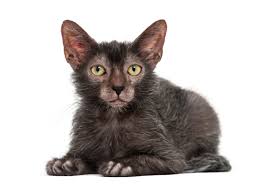
Lykoi
Conditions of detention
Lykoi cats thrive in various living environments, including apartments and larger homes. They enjoy interactive play and companionship with their human families, making them well-suited for households where they can receive plenty of attention.
Useful Fact:
Lykoi cats are known for their social and curious nature. They often seek out interaction with their human companions and enjoy being involved in family activities.
Nutrition and diet
Lykoi cats thrive on a balanced diet of high-quality cat food rich in protein, fats, vitamins, and minerals to support their high energy levels and overall health. Fresh water should always be available, and their diet should be monitored to prevent obesity.
Useful Fact: Lykoi cats might have slightly different dietary needs due to their active nature, so consult with a vet to tailor their diet appropriately.
Health
Lykoi cats are generally healthy with no breed-specific health issues. Regular veterinary check-ups, vaccinations, and preventative care are essential to maintain their health. Monitoring for common feline issues like dental disease and obesity is important.
Useful Fact: The unique coat of the Lykoi is due to a natural genetic mutation, and they do not have an undercoat, which might make them more susceptible to temperature changes.
Grooming and care
Lykoi have minimal grooming needs due to their sparse coat, but weekly brushing can help manage shedding and keep their skin healthy. Regular nail trimming, ear cleaning, and dental care are also necessary.
Useful Fact: Lykoi cats may shed more than other breeds during certain periods, making seasonal grooming a bit more intensive.
Education and training
Lykoi are intelligent and can be trained using positive reinforcement techniques. They can learn tricks, use a litter box efficiently, and follow basic commands with consistency and patience.
Useful Fact: Lykoi cats are naturally curious and enjoy problem-solving activities, making puzzle toys an excellent training tool.
Toys and entertainment
Interactive toys, puzzle feeders, and climbing structures are ideal for keeping Lykoi cats entertained. Providing a variety of toys helps to stimulate their active minds and prevent boredom.
Useful Fact: Lykoi cats have a playful nature and often enjoy chasing games and interactive play sessions with their owners.
Safety
Indoor living is recommended for Lykoi cats to protect them from outdoor hazards such as traffic, predators, and diseases. Ensure that windows and balconies are secure to prevent accidents.
Useful Fact: Due to their sparse coat, Lykoi cats may be more sensitive to extreme temperatures, so maintaining a comfortable indoor environment is crucial.
Accessories
Essential accessories for a Lykoi include a scratching post, comfortable bedding, litter boxes, and grooming tools. Interactive toys and climbing trees are also beneficial for their physical and mental stimulation.
Useful Fact: Providing heated beds or blankets can help keep Lykoi cats warm, especially in cooler climates.
Socialization
Lykoi cats are sociable and thrive on interaction with their human families and other pets. Early socialization helps them develop into well-adjusted adults who are comfortable in various environments.
Useful Fact: Lykoi cats often form strong bonds with their owners and enjoy being part of family activities, showing a high degree of loyalty.
Travel and Transportation
Lykoi can adapt to travel if introduced gradually. Using a secure carrier and providing familiar items like a blanket or toy can help reduce travel-related stress.
Useful Fact: Some Lykoi cats may enjoy car rides and exploring new places, making them good travel companions when properly acclimated.
Behavior and psychology
Lykoi are affectionate, playful, and inquisitive cats. They are known for their loyalty and strong bonds with their owners, often displaying dog-like behavior in their interactions.
Useful Fact: Lykoi cats can be quite vocal and expressive, using a variety of sounds to communicate their needs and feelings to their owners.
Legal aspects
Before acquiring a Lykoi, check local regulations regarding pet ownership, including licensing and microchipping requirements. Adherence to responsible breeding practices and animal welfare laws is also important.
Useful Fact: Lykoi cats are a recognized breed by major cat registries, including The International Cat Association (TICA), highlighting their growing popularity and acceptance in the feline community.


